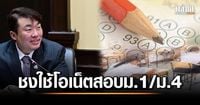In a significant move to enhance the education system in Thailand, Mr. Siriphong Angsakulkiert, the Deputy Minister of Education, announced the formation of a working group dedicated to managing examination processes for students entering Mathayom 1 and Mathayom 4. This initiative follows observations made during a recent field visit on April 5-6, 2025, where various challenges related to the examination criteria were identified. The Minister of Education, Police General Permpoon Chidchob, tasked Mr. Siriphong with leading this effort to streamline and standardize testing across schools.
During the visit, it became clear that the current selection criteria for student admissions were inconsistent across different schools, leading to potential inequities. For example, in Nonthaburi Province, schools collaborated to create a unified set of exam questions for Mathayom 1 and Mathayom 4. This approach aims to reduce disparities and enhance fairness in the examination process. Mr. Siriphong emphasized the importance of such collaborations, stating, "This helps reduce inequality and makes the examination process more fair."
One of the pressing issues highlighted was the burden placed on students traveling from various provinces to take exams in prestigious Bangkok schools. This travel not only incurs financial costs but also poses logistical challenges for families. To address this, Mr. Siriphong proposed the introduction of a centralized examination system, similar to the national basic education tests, known as O-NET. He suggested that schools with high competition rates could facilitate online exams at central testing centers in different provinces, paralleling the structure of the General Aptitude Test (TGAT) and the Academic/Professional Aptitude Test (TPAT).
However, Mr. Siriphong acknowledged concerns regarding the suitability of using O-NET for this purpose, as it is designed to assess overall academic achievement rather than specific selection criteria for further education. He stated, "The O-NET exam was designed to measure overall learning outcomes, while selection exams focus on assessing students' readiness for the next level of education." This disparity necessitates further discussions to create a suitable assessment framework that aligns with the goals of student selection.
Currently, preliminary talks are underway with leading schools, such as Mahidol Wittayanusorn School and Chulabhorn Royal Academy schools, which have expressed willingness to collaborate in this initiative. Mr. Siriphong noted, "If these top schools agree to reduce the burden of examinations on students and are willing to establish regional testing centers, it will significantly boost public confidence in the education system." He added that if the process is implemented smoothly, the new policy could be operational by the academic year 2569.
In parallel with these developments, the Teachers Council of Thailand has made strides in standardizing teacher qualifications. Assoc. Prof. Dr. Amornrat Weerathammo, the Secretary-General of the Teachers Council, reported that the council has established guidelines for testing and assessing professional competencies among teachers. This initiative is crucial for issuing professional teaching licenses, which are governed by regulations set forth in 2022 and amended in 2024.
During the Teachers Council meeting on February 27, 2025, the council approved the results of the second round of professional competency assessments, with 5,644 candidates successfully passing the tests. Assoc. Prof. Dr. Amornrat stated, "For those who pass the tests and assessments, the results can be used to request a professional teacher license according to the criteria and methods specified in the Teachers Council." This development marks a significant milestone in ensuring that teachers meet standardized qualifications necessary for effective teaching.
Furthermore, the council has established a clear process for revoking licenses if any discrepancies arise regarding the qualifications of those who passed the assessments. This ensures that the integrity of the teaching profession is upheld. The council's decisions regarding the assessments are final, reinforcing the importance of maintaining high standards within the teaching community.
For individuals interested in checking their status or the results of the assessments, the Teachers Council has made this information accessible online at www.ksp.or.th. This transparency is part of a broader effort to foster trust in the educational system and ensure that only qualified individuals are entrusted with the education of future generations.
As Thailand continues to navigate the complexities of educational reform, the initiatives led by Mr. Siriphong and the Teachers Council represent a concerted effort to improve the quality of education and ensure equitable opportunities for all students. By addressing the challenges in examination processes and standardizing teacher qualifications, these efforts aim to create a more effective and fair educational landscape.





